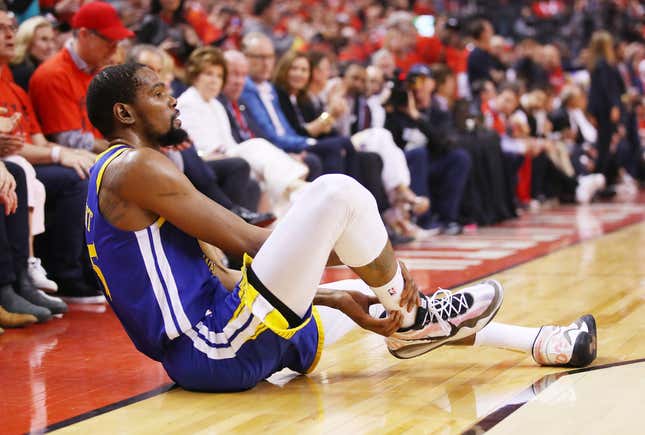
The reactions to a catastrophic NBA injury usually unfold in very simple terms. Stomachs drop, deep sympathies are expressed for the player involved, and everyone moves on while shaking their heads and grumbling about how sometimes life just isn’t fair. Rarely do such injuries lead to the general manager of the league’s reigning dynasty holding a postgame press conference and saying, through tears and sniffles, “If you have to, you can blame me.”
The injury Kevin Durant suffered in Game 5 of the NBA Finals last night, which by all accounts appears to be a serious Achilles injury, occurred within an almost unbelievable set of circumstances that make it feel like far more than just a bad break. Here was perhaps the best player in the world, having already spent an entire month at the center of the biggest storyline of the Finals while rehabbing from the most scrutinized calf strain in sports history, making a dramatic comeback in his team’s biggest game of the season, only to see that comeback lead to the worst possible result.
An injury this big and meaningful—if Durant’s Achilles is torn, it not only alters this series but the future of the entire NBA for years to come—can’t just quietly pass through the collective conscience of NBA fans and observers. That’s why Warriors GM Bob Myers made his tearful announcement from the dais last night. He knew that everyone was going to be looking for that someone to blame, and it was in his best interest to get out there and cut a sympathetic figure.
It’s extremely unlikely that Myers half-heartedly falling on his sword is going to calm anything down. There are simply too many targets available. Is it the team doctors’ fault for clearing Durant before he was ready? Did they misdiagnose the injury in the first place? Is it the front office’s fault for pressuring Durant to return more forcefully than they probably would have if it wasn’t assumed that he’ll be signing elsewhere this summer? Is it the sources who fed The Athletic a story about the “confusion and angst” some of Durant’s teammates were feeling about his prolonged absence who are to blame? Is it Tim Kawakami’s fault for writing a sports column? Is it the front office’s fault for deciding to sign DeMarcus Cousins instead of another wing player that could have helped pace Durant throughout the season? Is it Steve Kerr’s fault for riding Durant so hard throughout the Houston series and then playing him in 12 of the game’s first 14 minutes? Is it Draymond Green’s fault for planting the seeds of insecurity in Durant’s head way back in November? Is it the internet’s fault for constantly taunting Durant for being a hood ornament? Is it Kevin Durant’s fault for always being online in the first place and allowing all those barbs to get under his skin?
Engage in this exercise long enough, and you’ll find that there’s really no bottom to the rabbit hole. It’s entirely possible that someone, or multiple someones, do deserve to carry the blame, but will never be identified because we’ll never truly know what their motivations were. Those actors’ motivations may have been unknown even to themselves at the time decisions were being made.
Beyond some revelation that team medical staff grievously failed Durant in some way, either by misdiagnosing his injury in the first place, pushing him too hard to come back, or by misleading him when they reportedly told him that returning to action would not put him at risk for further injury, no easy answers are going to present themselves.
All that leaves us with is an overflow of frustration and no real place to direct any of it. Maybe the best thing to do is forgo what will ultimately be a fruitless search for villains, and separate the image of Durant sitting on the court, helplessly clutching at the back of his heel, from all the narrative context in which it sat. Once you do that, you’re left with a far simpler set of facts to reckon with: Kevin Durant was injured; after four weeks of rest and rehab, he decided to return from that injury; he got injured again. All there is to do in the face of something like that is shake your head and grumble about how sometimes life just isn’t fair.